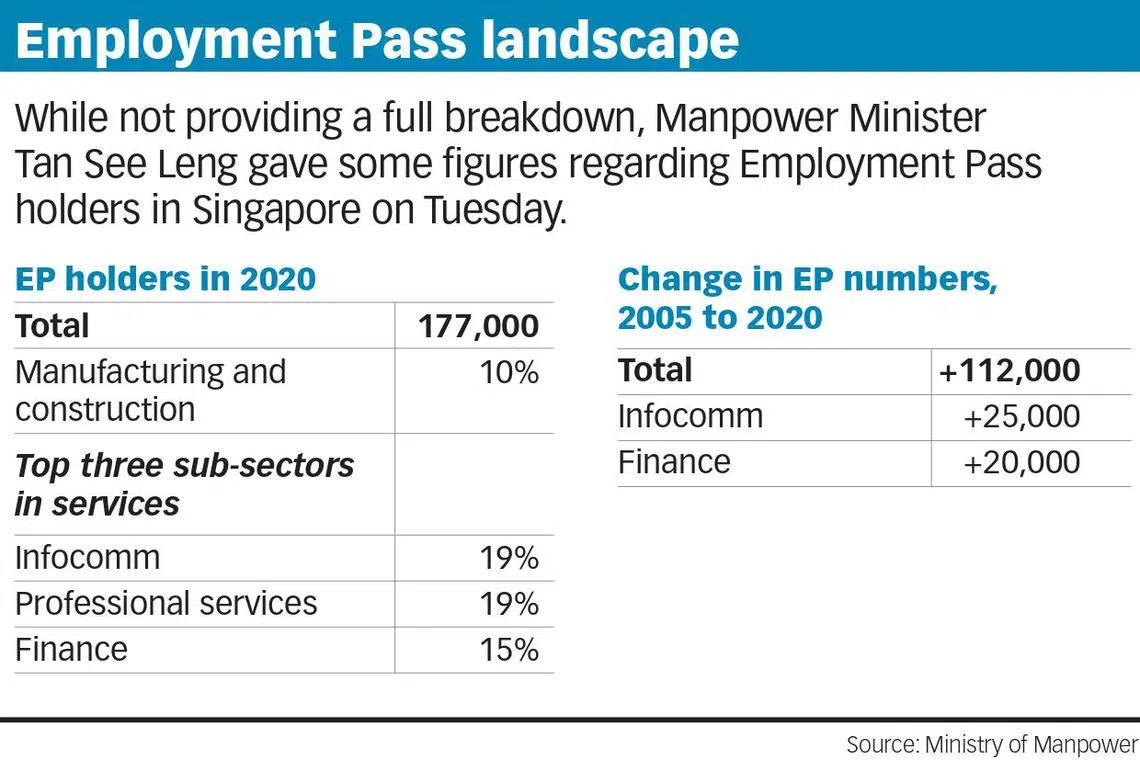Share of EP holders from India has roughly doubled since 2005

Singapore
THE share of Employment Pass (EP) holders from India has roughly doubled from about one-seventh in 2005, to one-quarter in 2020.
But that reflects the global market for tech talent, and is not due to more favourable treatment under the India-Singapore Comprehensive Economic Cooperation Agreement (CECA), Minister of Manpower Tan See Leng said in Parliament on Tuesday.
For foreign policy reasons, the government does not publish detailed statistics on the foreign workforce, especially by nationality, he said in a ministerial statement.
But he said he would share some numbers "to address the misconceptions and allow for a meaningful engagement on the issue at hand".
The top nationalities that comprise about two-thirds of Singapore's EP population have been consistent since 2005, he said. These are China, India, Japan, Malaysia, the Philippines, and the UK. Since 2005, the share of EP holders from India has risen, but the share of those from China has stayed relatively stable.
Navigate Asia in
a new global order
Get the insights delivered to your inbox.
This is not the result of more favourable treatment for Indian EP holders due to the CECA, he said. All work pass holders must meet the same criteria to enter, and there is no differentiation based on nationality.
Rather, this reflects the global demand and supply of tech talent.
Singapore's demand for technology talent has grown as the economy goes digital, and there are not enough local workers for available jobs. In the infocomm sector alone, for instance, there are 6,000 unfilled jobs now.
Firms decide which countries to get talent from, said Dr Tan. "Based on their needs, and the availability of the required talent, China and India, over the last decade or so, are two of the largest suppliers of tech talent."
But China has many tech unicorns and a huge demand for tech talent, so many Chinese stay in their country to work. "India's talent, on the other hand, have continued to look outwards. They also have the advantage of being English-speaking."
This is a global phenomenon, he added. India accounts for the most international migrants today. It is the second-largest source of immigrants to the United States and the third largest to the United Kingdom, two countries which are also developing technological capabilities.
"Given our relative shortage of manpower, even if the workers don't come from India, they will come from somewhere else," Dr Tan said, adding that such workers help to grow the economy and create jobs for locals.
Since 2005, EP numbers have risen by 112,000, with the finance and infocomm sectors accounting for 40 per cent of this rise. But over the same period, the number of local professionals, managers, and executives (PMEs) grew by 380,000.
Infocomm saw an increase of 25,000 EPs, but also 35,000 jobs created for local PMEs. In finance, there were 20,000 more EPs, but also 85,000 more jobs for local PMEs.

It is unsurprising that the increasing concentration of one nationality "has caused some social frictions, and anxiety to Singaporeans", said Dr Tan.
Singapore experienced a similar situation in the 2000s when the share of workers from China increased significantly, before tapering off. "Both then and now, the larger numbers did not go unnoticed, and they created frictions within our communities."
"We understand these concerns, which is why we review and update our work pass policies regularly," he said. "We always seek to balance the needs of our economy with the needs of our society."
Commenting on the debate, Singapore Management University professor Paulin Straughan said: "The transparency of how foreign talent are recruited, the safeguards in place to ensure that locals are not bypassed, and the reminder that we recruit globally because of our internal demand will certainly help Singaporeans appreciate the complex dynamics at play."
But Singapore University of Social Sciences associate professor Leong Chan-Hoong noted two angles that could also have been addressed. One is the gap between macroeconomic forces, and "the lived experience of average Singaporeans". "The importance of talent at the macro level cannot seemingly compensate the uncertainty and insecurity experienced by ordinary Singaporeans," he said.
A second angle is how free trade agreements relate to population, and whether they can "help build a more sustainable economy that is independent of population growth".
Dr Tan said that the government monitors the concentration of nationalities at the firm level too.
When shortlisting firms for the Fair Consideration Framework watchlist, the Ministry of Manpower (MOM) looks at whether there is a high concentration of foreigners from a single country, as well as a high share of foreign PMETs (professionals, managers, executives and technicians) relative to industry peers.
Being in the watchlist is not evidence that the firm has committed a wrong, but a sign that unfair hiring might be occurring, said Dr Tan.
The Tripartite Alliance for Fair and Progressive Employment Practices engages watchlisted firms to review and improve, where needed, their hiring and HR practices.
Most firms cooperate and exit the watchlist, while the small minority that do not may have their work pass privileges curtailed or suspended.
"This is an effective process, albeit resource-intensive," said Dr Tan, noting that there are now about 400 firms on the watchlist. The government is looking at complementing and strengthening the watchlist "with a more scalable approach".
Many Singaporeans understand the economic need for foreign talent, but must also be assured that the inflow is being calibrated and locals are not losing out, said Institute of Policy Studies principal research fellow Mathew Mathews.
He added: "Over time as people notice that businesses which flout labour rules and unfairly prioritise foreigners over locals are taken to task, they might gain greater confidence that immigration policy here is ultimately working for the good of Singaporeans."
Decoding Asia newsletter: your guide to navigating Asia in a new global order. Sign up here to get Decoding Asia newsletter. Delivered to your inbox. Free.
Copyright SPH Media. All rights reserved.
